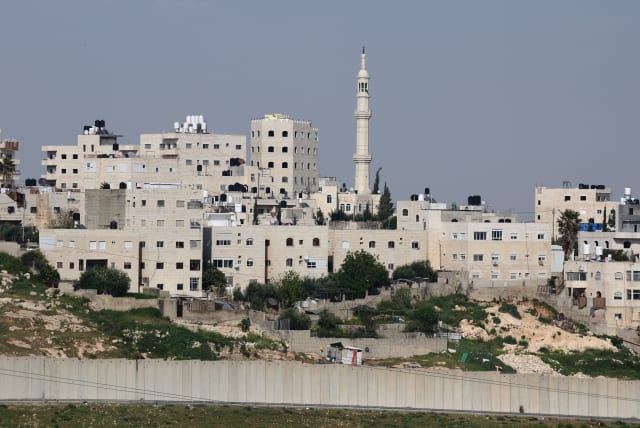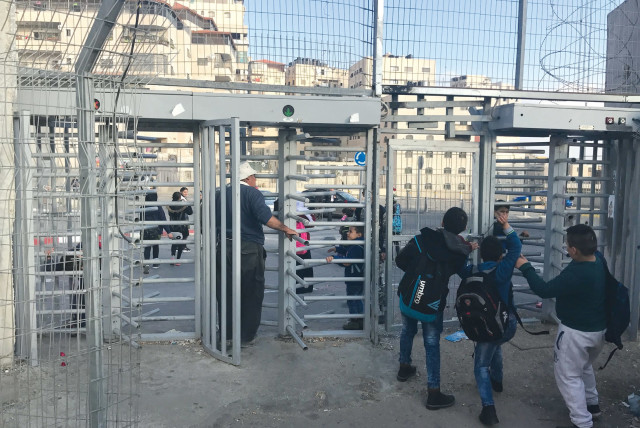Facing reality: Beyond the state of denial in Israeli-Palestinian relations - opinion

I tried to explain that just like us, almost all Palestinians want to control their own destiny and they do not want to live under the oppression and humility of occupation.
Very early on Monday morning, I flew back from Tbilisi, Georgia, after a long weekend organized by ROPES – the Regional Organization for Peace, Economics, and Security. Their main thrust is to leverage relations between Israel and the Arab countries that have peace treaties with Israel to refocus attention on the Palestinian-Israeli conflict. With the exception of myself, the conference participants were all young professionals with amazing experience, dedicated to making our world a better place.
While waiting for my 1:20 a.m. flight, I struck up a conversation with two young Palestinians sitting across from me. I heard their accent and asked if they were from Jerusalem. They were and I said that I am also from Jerusalem. They asked me from where and I answered Kiryat Hayovel. I asked them where they were from and they responded Shuafat.
Continuing our conversation, I learned that one of them was studying medicine at Al-Quds University in Abu Dis. I told him that the dean of the Al-Quds Medical School is a friend of mine. He asked me how I knew him, and I told him how the Impact Investment Fund I worked with last year had researched the possibility of investing in a teaching hospital for Al-Quds Medical School. However, Israeli regulations would make it next to impossible to establish the hospital, which would take 10 years just to receive a license.
The Holy Land Bond, providing loans for Palestinian developers in east Jerusalem
The other young man was his cousin, a worker employed in West Jerusalem. They complimented me on my Arabic and asked how I knew the language so well. I said that I learned from people I know and work with and that I participate in a spoken Arabic study group – for several years now. They then asked me more about my work and I told them about the Holy Land Bond, the impact investment fund that was established in London by James Holmes.
One of the avenues of investment that we are working on is enabling Palestinian banks to provide loans for Palestinian developers in East Jerusalem for the building of affordable licensed housing for young Palestinian families. For many reasons, Palestinian real estate developers in East Jerusalem do not have access to capital. We are working on resolving that issue.
I then asked them where in Shuafat they live because some of the housing projects we are looking at are in Shuafat. They said that they do not live in Shuafat the village/neighborhood, but rather in the Shuafat refugee camp, probably the poorest and most underdeveloped part of Jerusalem within the Israeli Jerusalem municipal borders. It is not unusual for the 60,000 residents of the Shuafat refugee camp to be unwilling to disclose their true place of residence.
Humans without Borders, a humanitarian service to help our neighbors
WHILE WE were talking, two middle-aged Israeli men sat next to me and heard me tell the two young Palestinians that I volunteer in an organization called Humans without Borders, which enlists volunteers from Israel to drive sick Palestinian children to the hospitals in Jerusalem and back to their homes in the West Bank. The Jewish gentleman next to me, who told me that he is of Moroccan origin and understands Arabic, asked if I drive Jewish Israeli children too.
From his tone, it was clear that he was beginning to provoke an argument. I told him that I did not, nor did the organization, and that most Israeli children in Jerusalem who need to go to the hospital have their parents and many means of transportation at their disposal without Israeli army checkpoints and the need to have an Israel-issued permit in order to get health care. He then asked if I am doing it as part of an agenda: “Are you with those human rights people?”
I told him that we were doing a humanitarian service to help the people who are our neighbors and who are living under our military occupation. He then responded that the problem is that we want peace but they don’t, they want to kill us. We just want to live, he said, and they only want to kill us and throw us out of here.
Both sides want peace and claim that the other side does not
I looked over to the two young men from Shuafat refugee camp, who are quite fluent in Hebrew and I asked them if they think that the Palestinian people want to live in peace or want to kill all of the Jews.
At first, I saw them shrink in their seats as the conversation became louder and more acrimonious. They said they wanted the Israeli occupation to end so that they could live in peace.
I responded that both sides want peace and claim that the other side does not. My Israeli-Moroccan friend said we all have good lives and that if they, the Arabs didn’t hate us, we could all live in peace.
I then pointed out that among the more than 380,000 Palestinians living in Jerusalem, close to 80% are living below the poverty line (compared to only around 50% of the city’s ultra-Orthodox); and as they are not Israeli citizens, they cannot vote in national elections. How can you expect them to just live and let live? They have a right to fight for freedom and equality.
When reality is unbearable, many Israelis choose to live in denial
The medical student responding to the Israeli man who claimed that the Palestinians in Jerusalem have a great life stood up with his telephone in hand and opened a video of border guards harassing him and his friend at the Shuafat camp checkpoint they had to pass when they were on their way to the airport (because the camp is on the other side of the Israel West bank barrier). The Border Police opened their suitcases and threw their clothes onto the street – while shouting at them in Hebrew.
The two Israelis said that they employ lots of Palestinians (in construction, I assumed) and that all of them are happy living in Israel. It is just, they said, that the Palestinian leaders teach them all to hate Jews. I tried to explain that just like us, almost all Palestinians want to control their own destiny and they do not want to live under the oppression and humility of occupation. By this time, the tone was rising and I said, “halas” – “enough” – I don’t want to argue.
After a few minutes, they got up and walked away. I suppose that when reality is really unbearable it is easier to live in a world with blinders where you don’t have to directly face up to the consequences of your own actions.
Living in denial is definitively how so many Israelis carry out their lives.
The writer, a political and social entrepreneur, is dedicated to peace between Israel and its neighbors. A founding member of the Kol Ezraheiha-Kol Muwanteneiha (All the Citizens) party, he directs The Holy Land Bond and is Middle East director for ICO – International Communities Organization.
Jerusalem Post Store
`; document.getElementById("linkPremium").innerHTML = cont; var divWithLink = document.getElementById("premium-link"); if (divWithLink !== null && divWithLink !== 'undefined') { divWithLink.style.border = "solid 1px #cb0f3e"; divWithLink.style.textAlign = "center"; divWithLink.style.marginBottom = "15px"; divWithLink.style.marginTop = "15px"; divWithLink.style.width = "100%"; divWithLink.style.backgroundColor = "#122952"; divWithLink.style.color = "#ffffff"; divWithLink.style.lineHeight = "1.5"; } } (function (v, i) { });

